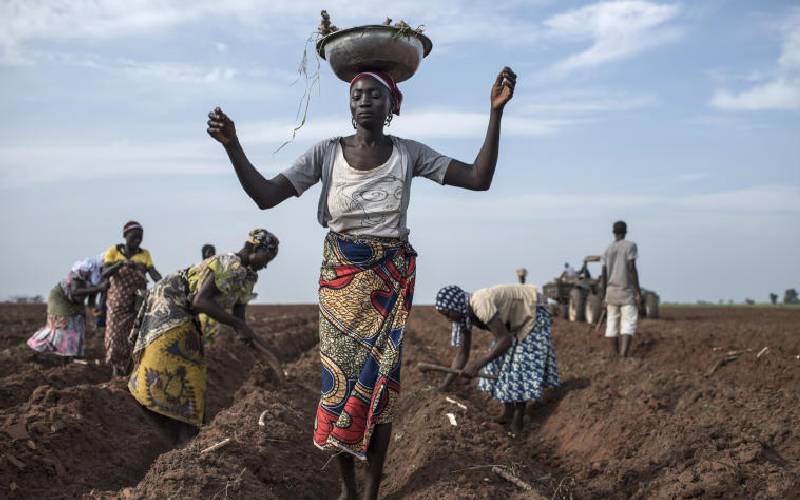Women planting cassava on newly prepared land in Nigeria, July 12, 2017. [AFP, Courtesy]
A walk through Nairobi’s Karura Forest on a cool morning is nostalgic. One cannot help but marvel at various native trees and shrubs. A shrub, we learned, is known as mutatis in Gikuyu language (umbrella tree).
Its leaves and branches are traditionally used to ripen bananas while its smaller twigs are used as natural toothbrushes. Another tree called muhugu (silver oak) is said to provide ideal firewood that does not give off smoke and takes a long time before the fire goes out.
In a 10 kilometer walk, we had acquired useful information about an urban forest that still exists thanks to the efforts of a woman, the late Nobel Prize winner, Professor Wangari Maathai!
Women have been the guardians of the environment in traditional societies around the world. In Africa, they have been providers of food, stewards of seed banks, and decision makers in household energy use.
They have practiced what we now call sustainable agriculture and the circular economy since ancient times, using dried elephant dung as fuel or cow horns as drinking cups. In addition, they know the medicinal properties of everyday plants and herbs. All of this cross-generational knowledge is disappearing as women are left out of the climate conversation.
Unpredictable weather
Climate change is a reality in Kenya and across the African continent. While Kenya and other developing economies have contributed the least to global emissions that are driving up temperatures and causing unpredictable weather, we all bear the brunt; from locust swarms and drought here at home to typhoons in Mozambique and other parts of the world.
The current era of globalization and economic reform is based on the principle of unlimited growth in a world of limited resources. This notion can only exist because of the powerful stranglehold on resources by vulnerable people, creating a culture of plunder – a culture in which nature, local communities and women are the losers in the equation.
Science exercises its mastery over nature and biotechnology companies become “creators”. Thousands of years of community effort are invalidated by the patenting of seeds and genes. Unfortunately, rather than leading to increased food and nutrition security, these human activities lead to climate change and species extinction.
The so-called Green Revolution has resulted in an increased use of herbicides, pesticides and Terminator seeds. and has led to an industrialized agricultural sector that produces up to 40% of greenhouse gas emissions. Technological solutions to the climate crisis, the food crisis and the energy crisis are only making old problems worse and creating new ones (remember polythene bags were created ostensibly to save forests?)
Globalization depends on the deregulation of trade coupled with the privatization and commodification of seeds, land, water and people. It degrades social values, deepens patriarchy and intensifies violence against women. This translates into increased economic vulnerability for women, making them even more vulnerable to disasters, including the Covid-19 pandemic, which has led to an unprecedented level of violence against them.
Although women have always been central to the livelihoods and security of their communities, they have been engaged for centuries in the effort to create life-affirming societies. In the current context, where ‘catch-up’ development is based on ‘modernization’, attention has been diverted from women’s skills in protecting sustainable local economies.
The medium, small and medium enterprise (MSME) sector in Africa is dominated by women and provides over 80% of all consumer goods. However, women are largely excluded from critical conversations about the economy and the environment.
The economic interdependence and multilateral norms that globalization has emphasized in recent decades have resulted in the creation of monocultures controlled by global corporations.
This model focuses primarily on “growth” and does not take into account women’s contribution to the economy in general, such as excluding the contribution of unpaid work and in particular climate action.
Despite the continued challenges of climate change on the continent, part of the solution is not more high-level events laden with jargon and empty promises, but honest conversations that deepen cultural repositories of knowledge and mutual respect. each other and the environment.
We have local solutions if we include Wanjiku and take advantage of decentralized functions and opportunities for public participation. Let us take our responsibilities as citizens and do not remain passive victims of socio-economic systems that do not work for us and future generations.
polluting countries
Environmental reparation is a debt of polluting countries to those who have contributed the least to this climate crisis. $100 billion a year was pledged by developed countries at the 2021 UN Climate Change Conference (COP26) held in Glasgow. It is time for the industrial nations to pay.
Government, the private sector, civil society and citizens in general can adopt policies and business models that are based on stewardship and balance. #BetterTogether is not just a hashtag but strong words that we must live by.
In the words of our young climate activist and founder of the Green Generation Initiative Elizabeth Wathuti, “I believe in our human capacity to care deeply and act collectively”, our lives depend on environmental justice.
Ms. Maloba is a New Faces New Voices for Women in Finance – Kenyan Champion and International Cooperation Advisor. Ms. Wangeci is New Faces New Voices for women in finance – Kenya Trustee and International Development Consultant in Inclusive Market Systems.




